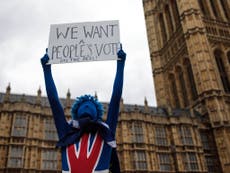Airbus's warning over Brexit is blunt, timely and right
We hear precious little about any companies, foreign or domestic, boosting investment and creating jobs specifically because of the ‘exciting opportunities’ Leavers say will be offered by Brexit
While the warning about a post-Brexit loss of investment and jobs at Airbus in the UK is serious enough in itself – 100,000 jobs depend on the firm when you take into account the full supply chain – the fact that the company has chosen to make its fears public raises additional concerns. After all, what it indicates is that industrial leaders are starting to prepare for the worst (with good cause) and feel that they have no option but to warn about the dangers. The drama is real.
Apart from the political chaos and indecision it has induced, one of the most striking aspects of Brexit so far – two years on from the referendum – has been the shyness of major industrial and engineering companies to speak out. This is partly due to a general and traditional reluctance on the part of companies to “interfere” in politics; but it has been compounded in some cases with a wish to remain on good terms with the UK government as a major customer.
Many foreign direct investors into the UK, for example in the motor industry, are especially sensitive to the charge that they would be telling another country’s people what to do. To have German, French, Indian or Japanese-based firms talking publicly about running down UK plants and sacking British workers might be counterproductive, so they often thought. Therefore they have mostly kept quiet – until now.
Yet with an industrial catastrophe around the corner, they have finally come to a point where they feel they have little left to lose. The lack of progress on a post-Brexit trade deal, or even a workable transitional period, have forced industrialists to activate “no deal” contingency plans, and to speak plainly about the dangers ahead.
Airbus has been especially blunt. By the standards of such statements, to say that the company would “carefully monitor any new investments in the UK and refrain from extending the UK suppliers/partners base” is tantamount to a direct threat to pull out of Britain within a fairly short space of time. It requires little decoding.
The warning is to be welcomed. Economic statistics suggesting a period of calm, albeit already with slower growth, are misleading – for the UK is still in the EU single market, customs union and all the other complex regulatory bodies that make this, the largest economic bloc in the world, work so efficiently. That will soon end – with, at best, a limited deal; and, at worst, a collapse onto WTO trade terms. In such circumstances the UK will suffer much more than the EU.
Even if tariffs and quotas were to be avoided, what industry has been trying to tell government for months remains the truth: that any form of customs checks and controls will cost businesses too much time and money. This is because components cross borders many times in integrated manufacturing operations, and firms run “just in time” manufacturing techniques. Even modest delays can destroy the flow of production at vast coat. The airy talk about technological solutions or a “trade partnership” have convinced few.
If there is an opportunity to move plant and jobs to Europe, with low-cost eastern European locations looking especially tempting, then many companies will take it, rather than face trying to work outside the EU. The cost of Brexit will not only be factories and offices closing in the UK – but also the “invisible” loss of factories and offices and jobs that would have been created in the UK had the nation decided to stay in the EU, or at least the EU customs union and single market.
The claim is made, predictably, that the French, German and Spanish governments have stakes in Airbus, and that therefore the Airbus contingency plan is all part of some anti-British conspiracy. Yet none of this would ever have been dreamt of if the UK wasn’t leaving the EU – and if it hadn’t also set down so many red lines about future trading and settled for a short transition period.
If the French, German and Spanish governments were somehow working to push the British to remain in the EU customs union and single market, and to retain Airbus’s British operations, then it is an odd sort of blackmail that works in the interests of the country being blackmailed, protecting British jobs and investment.
Only around 10 per cent of the British economy is now accounted for by manufacturing. Yet it sustains may highly paid and skilled jobs, and provides the exports to help the country pay its way in the world. So it matters. In any case, many of the problems created by Brexit also apply to the City of London, the energy sector, pharmaceuticals, air travel, software, new technologies, agriculture and a wide range of professional services.
What will happen at Airbus will happen across the economy, because the same basic forces will be at work. Loss of markets; additional bureaucracy and cost; difficulty bringing in staff from the EU; rejection of British goods and services because they do not meet single market standards – these factors are common across companies and sectors.
By contrast, we hear precious little about any companies, foreign or domestic, boosting investment and creating jobs specifically because of the “exciting opportunities” Leavers say will be offered by Brexit. Nothing, in fact.
Many will have sympathy with those marching and protesting this weekend for a People’s Vote; in other words, a “final” referendum when the terms of the Brexit deal, if any, are known. Parliament too, though sometimes hesitantly, has laid out its claim for a say on approving the final Brexit agreement with a “meaningful vote”.
Either or both of those will help the British find a way to be at ease with the huge decisions now being taken. For industry, though, the lack of progress speaks far more loudly, and they cannot afford to wait for a last-minute deal. Hence the increasingly panicky noises emanating from usually clam and taciturn businesspeople.





Join our commenting forum
Join thought-provoking conversations, follow other Independent readers and see their replies